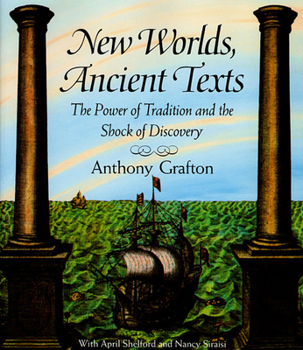New Worlds, Ancient Texts: The Power of Tradition and the Shock of Discovery
Select Format
Select Condition 
Book Overview
Describing an era of exploration during the Renaissance that went far beyond geographic bounds, this book shows how the evidence of the New World shook the foundations of the old, upsetting the authority of the ancient texts that had guided Europeans so far afield. What Anthony Grafton recounts is a war of ideas fought by mariners, scientists, publishers, and rulers over a period of 150 years. In colorful vignettes, published debates, and copious...
Format:Paperback
Language:English
ISBN:0674618769
ISBN13:9780674618763
Release Date:March 1995
Publisher:Belknap Press
Length:296 Pages
Weight:1.45 lbs.
Dimensions:0.8" x 8.0" x 9.2"
Customer Reviews
3 ratings
Re-imagining the (Renaissance) World
Published by Thriftbooks.com User , 17 years ago
'New Worlds, Ancient Texts' was the companion to a 1992 exhibition of the same name at the New York Public Library. What is amazing is how well this book still stands on its own years later and in absentia from that exhibition. Grafton (with help from Nancy Siraisi) shows how the ancient authors--on which 16th/17th c. Europeans relied so heavily to explain the known (and unknown) world--utterly failed to provide an adequate roadmap to the cosmos in the face of the discovery and exploration of the Americas. "Between 1550 and 1650," writes Grafton, "Western thinkers ceased to believe that they could find all important truths in ancient books." As a result, Europeans were forced to confront the paucity of much of the classical knowledge on which they had relied for so long, and begin to develop their own mechanisms, theories, and models for understanding the world. This suggests the beginning of 'modern' knowledge; early-modern Europeans finally began to think for themselves, even if they still operated under the "shades of old images." Grafton offers some fascinating examples of just how far the Europeans were willing to stretch the authority of the ancients to try accommodate new knowledge. In almost every case, the ancients were stretched so far they snapped. In Grafton's capable hands, this short (and nicely illustrated) work is one of the best books available for understanding the impact of the discovery of the new world on the West's classical intellectual heritage.
overseas overviews
Published by Thriftbooks.com User , 21 years ago
Not the most stunning or innovative of Professor Grafton's works, makes a sweeping review from the expectations held by the world of humanists received from Greek, Latin, and Arabic forerunners to the explosion and expansion of these expectations due to America's discovery. Grafton is a smooth and engaging writer, who can bind the vast realms of his study into fine sentences and clear argumentation.The text consists of five chapters, intermittent miniature biographies of more interesting or less frequently known players, and luxurious black and white reproductions of images and manuscripts of the age. The text runs its course and neither references the small biographies nor acknowledges the handsome illustrations. It is very possible that one will skip over these images as accessory to follow the sweep of the author's narrative, only to revisit them later. Sweeps and anecdotes describe the nature of the investigation rather than patient analysis of sites and sights. This book seems to share only the prettiest berries plucked from Grafton's years as a tender of the tree.This book more than adequately accounts for the changes in European thought on account of the discovery not just of new lands, but of new worlds, new diseases, drugs, and, as important, the discovery of the limitations of many ancient texts. Again, Grafton is beguiling, informative and masterful at his craft. will be equally welcome reading for those who enjoy the period and those who wish to find a compelling way to enter it.
A correction to my earlier review
Published by Thriftbooks.com User , 24 years ago
I posted a review here on October 10. I want to make a small correction, in case I confused anyone. The book I recommended looking at, if you can find a copy, is "Off the Beaten TRACK in the Classics," not "Off the Beaten PATH...." The author is C. Kaeppel, and it was published in Melbourne, Australia, in 1936.






